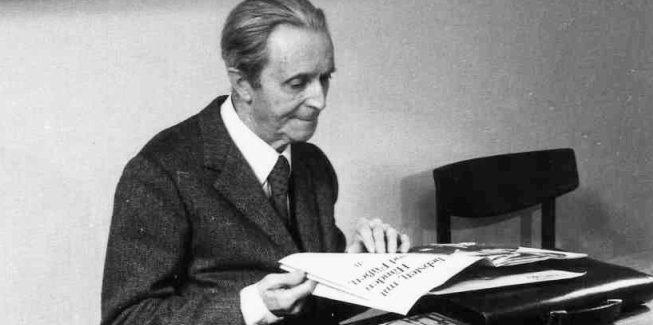
Apr 18, 2017 | Non categorizzato
 November 3, 1955 If universal history is humanity’s fifth Gospel, personal events also are for each of us. Seen from God’s perspective, they appear designed to bring us from being scattered back to unity with God. Detachment from people dear to us and losing distinctions can become a way of clearing out all human factors and leave us alone with God. Thus every day takes on the value of a divine adventure, if it is used to ascend along a ray – our ray – that connects us to God’s sun. Life has been called a march toward death, but it is progress toward freedom, the peak where the Father awaits us. So it is a march towards life, one that never ends. December 19, 1956 Christian wisdom, in asking us to renounce ourselves, is not really about renouncing, but gaining. In place of human ambitions, divine ambitions ignite. It recommends we put God in place of our ego, and by doing so, lift ourselves up from the human level to the divine one, together with the Trinity. It is humility that works limitless greatness. This is why eventually, from that height, the world appears wretched, riches appear chaff and great things turn to sand. So renounce ourselves to be always to be with God, transfer the eternal into time, make the earth a paradise. Suffering becomes raw material for greatness; the cross becomes the stairs to the eternal Father. December 26, 1956 Life is a unique opportunity given us to love. October 16, 1959 In response to individualism today, people nourish their collective lives and give socialization a central role in study and education. It is a movement that helps guide us toward our brother and pushes us to ascend towards God linked together. Yet there is also a danger in doing this: that in the fury of staying with those around us, we forget how to stay with God. Our brother is valuable as a ianua coeli (gate of heaven), but if one cannot see the Father behind him, one risks substituting the desolation of individualism with the desolation of the group. It is the Father who accompanies us, helps us, enlivens us. This is why, with the delusions that rain down each day on the human experience, he reminds us that there is also a divine experience. Or better, that the communion with our brothers passes to the Father, and from the Father returns to our brother. Igino Giordani
November 3, 1955 If universal history is humanity’s fifth Gospel, personal events also are for each of us. Seen from God’s perspective, they appear designed to bring us from being scattered back to unity with God. Detachment from people dear to us and losing distinctions can become a way of clearing out all human factors and leave us alone with God. Thus every day takes on the value of a divine adventure, if it is used to ascend along a ray – our ray – that connects us to God’s sun. Life has been called a march toward death, but it is progress toward freedom, the peak where the Father awaits us. So it is a march towards life, one that never ends. December 19, 1956 Christian wisdom, in asking us to renounce ourselves, is not really about renouncing, but gaining. In place of human ambitions, divine ambitions ignite. It recommends we put God in place of our ego, and by doing so, lift ourselves up from the human level to the divine one, together with the Trinity. It is humility that works limitless greatness. This is why eventually, from that height, the world appears wretched, riches appear chaff and great things turn to sand. So renounce ourselves to be always to be with God, transfer the eternal into time, make the earth a paradise. Suffering becomes raw material for greatness; the cross becomes the stairs to the eternal Father. December 26, 1956 Life is a unique opportunity given us to love. October 16, 1959 In response to individualism today, people nourish their collective lives and give socialization a central role in study and education. It is a movement that helps guide us toward our brother and pushes us to ascend towards God linked together. Yet there is also a danger in doing this: that in the fury of staying with those around us, we forget how to stay with God. Our brother is valuable as a ianua coeli (gate of heaven), but if one cannot see the Father behind him, one risks substituting the desolation of individualism with the desolation of the group. It is the Father who accompanies us, helps us, enlivens us. This is why, with the delusions that rain down each day on the human experience, he reminds us that there is also a divine experience. Or better, that the communion with our brothers passes to the Father, and from the Father returns to our brother. Igino Giordani
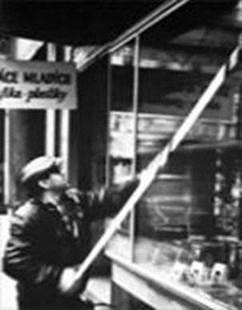
Apr 17, 2017 | Non categorizzato
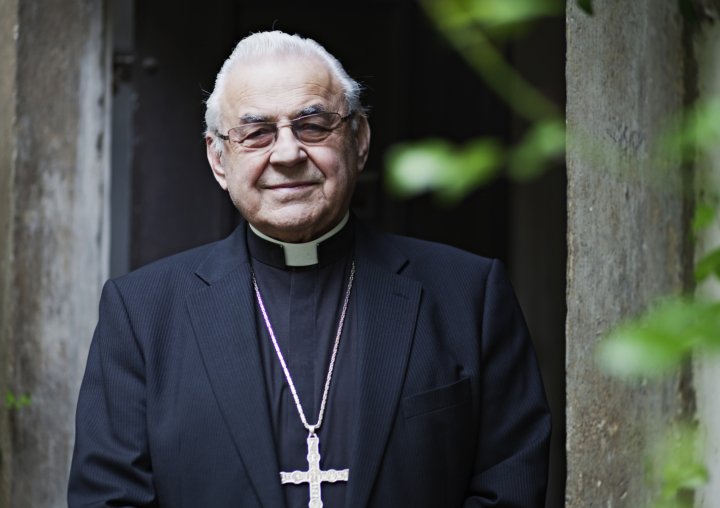 “Everything that has happened in my life has been a gift from God. My last name means ‘wolf’, and my personality is a bit like one. Yet when I started to live the Gospel in the light of the spirituality of unity, my wolf life finished, and my life as Miloslav, which means ‘gracious,’ began.” Thus began the then archbishop, who continued: “In 1964 I went to the DDR (East Germany) to thank a priest who regularly sent me theology books – there weren’t any where we were. He had learned of the spirituality of unity at Erfurt. He told me how the Focolare Movement began and spoke to me of Jesus Forsaken. To tell the truth, I didn’t understand much. I do remember that he gave me a text by Chiara Lubich.” He later met Natalia Dallapiccola, one of the first focolarine, who had also moved to the DDR. The cardinal was not yet even a seminarian, but would become one shortly. “I had many opportunities to to experience that this spirituality was real,” especially with other seminarians who were hard to deal with. It was with one of these that he actually began to share the ideal of unity. “After I was ordained in 1968, I was appointed secretary for the bishop of České Budějovice, a very deep person.” The bishop, however, found it difficult to accept the liturgical reform that had come with Vatican II. “I found myself judging him, but the focolarini explained to me that I had to love him instead of criticize him. At the time, I experienced that unity was the way to understand things, and to help others understand.” After 1968, communism came to power, and Miloslav, who quite influential with young people, was sent far away to a parish lost in the mountains. “There I started to understand what I had been told about Jesus Forsaken. I placed my situation in God’s hands, just as Jesus on the cross had entrusted himself to the Father. It was my first profound encounter with Jesus Forsaken.”
“Everything that has happened in my life has been a gift from God. My last name means ‘wolf’, and my personality is a bit like one. Yet when I started to live the Gospel in the light of the spirituality of unity, my wolf life finished, and my life as Miloslav, which means ‘gracious,’ began.” Thus began the then archbishop, who continued: “In 1964 I went to the DDR (East Germany) to thank a priest who regularly sent me theology books – there weren’t any where we were. He had learned of the spirituality of unity at Erfurt. He told me how the Focolare Movement began and spoke to me of Jesus Forsaken. To tell the truth, I didn’t understand much. I do remember that he gave me a text by Chiara Lubich.” He later met Natalia Dallapiccola, one of the first focolarine, who had also moved to the DDR. The cardinal was not yet even a seminarian, but would become one shortly. “I had many opportunities to to experience that this spirituality was real,” especially with other seminarians who were hard to deal with. It was with one of these that he actually began to share the ideal of unity. “After I was ordained in 1968, I was appointed secretary for the bishop of České Budějovice, a very deep person.” The bishop, however, found it difficult to accept the liturgical reform that had come with Vatican II. “I found myself judging him, but the focolarini explained to me that I had to love him instead of criticize him. At the time, I experienced that unity was the way to understand things, and to help others understand.” After 1968, communism came to power, and Miloslav, who quite influential with young people, was sent far away to a parish lost in the mountains. “There I started to understand what I had been told about Jesus Forsaken. I placed my situation in God’s hands, just as Jesus on the cross had entrusted himself to the Father. It was my first profound encounter with Jesus Forsaken.”

Vlk worked as a window cleaner
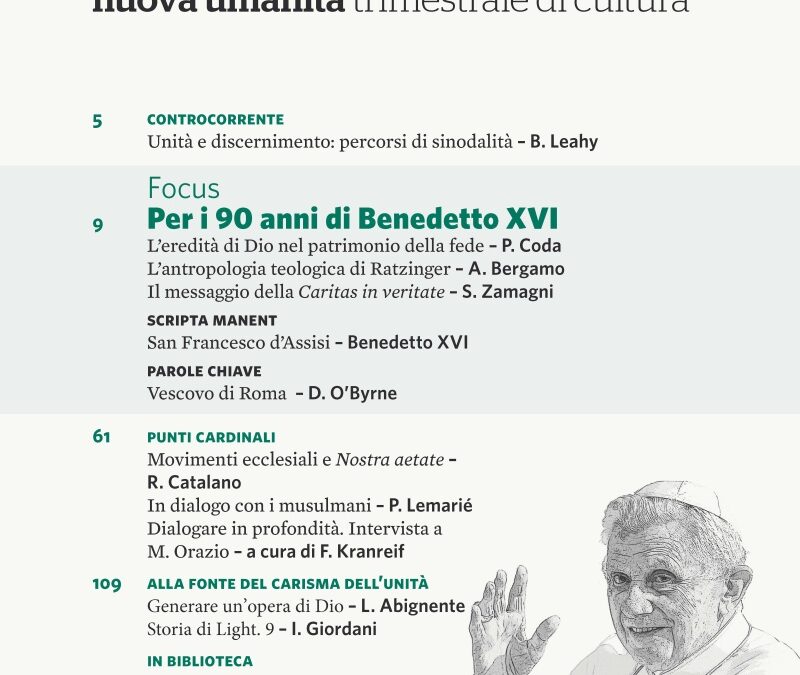
Apr 16, 2017 | Non categorizzato
 Joseph Ratzinger was born 90 years ago, on April 16, in Marktl am Inn, a country town of Bavaria. The 1927 calendar marks Holy Saturday as the day of his birth but, in 2017, his birthday is celebrate on Easter Sunday. The Focolare extends its best wishes to Benedict XVI for all that he has meant to it, to the Church and to humankind. As an expression of our affection and gratitude, the New Humanity Journal has already dedicated the Focus of its 25th edition to him. Compiled by Declan O’Byrne, the Focus section includes scholars such as Piero Coda, Stefano Zamagni and Antonio Bergamo who explore the theological, anthropological and social ethical dimensions of Benedict’s thinking. In a Church where often artificial conflicts arise between supporters of one or another ecclesial view, the New Humanity Journal dedicated to Benedict XVI presents a contribution by Brendan Leahy, Bishop of Limerick Ireland, on the need for a single synodal approach. The artuckes are in the process of being translated and will soon appear in other Focolare publications.
Joseph Ratzinger was born 90 years ago, on April 16, in Marktl am Inn, a country town of Bavaria. The 1927 calendar marks Holy Saturday as the day of his birth but, in 2017, his birthday is celebrate on Easter Sunday. The Focolare extends its best wishes to Benedict XVI for all that he has meant to it, to the Church and to humankind. As an expression of our affection and gratitude, the New Humanity Journal has already dedicated the Focus of its 25th edition to him. Compiled by Declan O’Byrne, the Focus section includes scholars such as Piero Coda, Stefano Zamagni and Antonio Bergamo who explore the theological, anthropological and social ethical dimensions of Benedict’s thinking. In a Church where often artificial conflicts arise between supporters of one or another ecclesial view, the New Humanity Journal dedicated to Benedict XVI presents a contribution by Brendan Leahy, Bishop of Limerick Ireland, on the need for a single synodal approach. The artuckes are in the process of being translated and will soon appear in other Focolare publications.
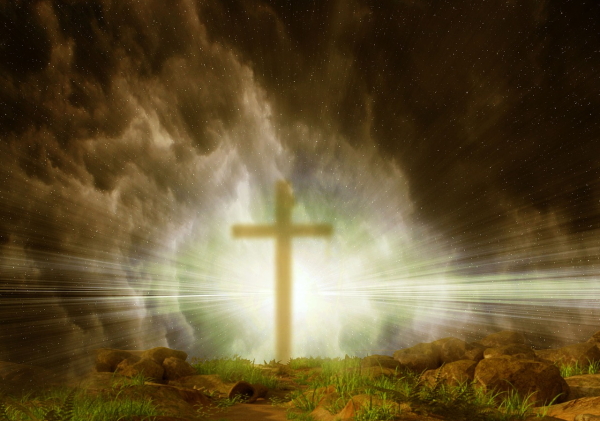
Apr 15, 2017 | Non categorizzato
 “Come, Lord Jesus”! Looking at you, our vocation to love will know no fear. Awaiting your coming, we will build this life well and, as soon as the next life opens up before us, we will plunge into the adventure that knows no end. You have conquered death and, in this our prayer, we feel you have conquered death in us too, in our hearts. “Come Lord Jesus!” always, in all of us. There will not be death, but you. There will be the Risen Lord; and this is already Easter. Best wishes to you all for a glorious, uninterrupted Easter, one that is fruitful, indeed very fruitful, for us, for the Church and for the world. “Come, Lord Jesus”! Looking at you, our vocation to love will know no fear. Awaiting your coming, we will build this life well and, as soon as the next life opens up before us, we will plunge into the adventure that knows no end. You have conquered death and, in this our prayer, we feel you have conquered death in us too, in our hearts. “Come Lord Jesus!” always, in all of us. There will not be death, but you. There will be the Risen Lord; and this is already Easter. Best wishes to you all for a glorious, uninterrupted Easter, one that is fruitful, indeed very fruitful, for us, for the Church and for the world.
Chiara Lubich
C.LUBICH, Cercando le cose di lassù, Rome 1992, p.136. |
|
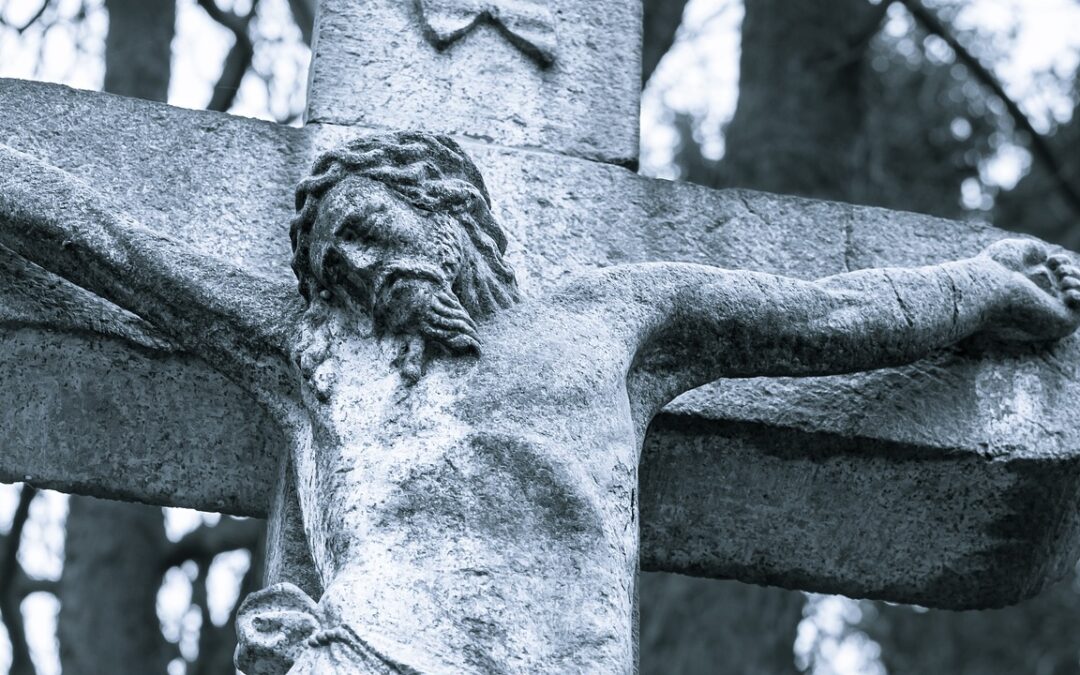
Apr 14, 2017 | Non categorizzato
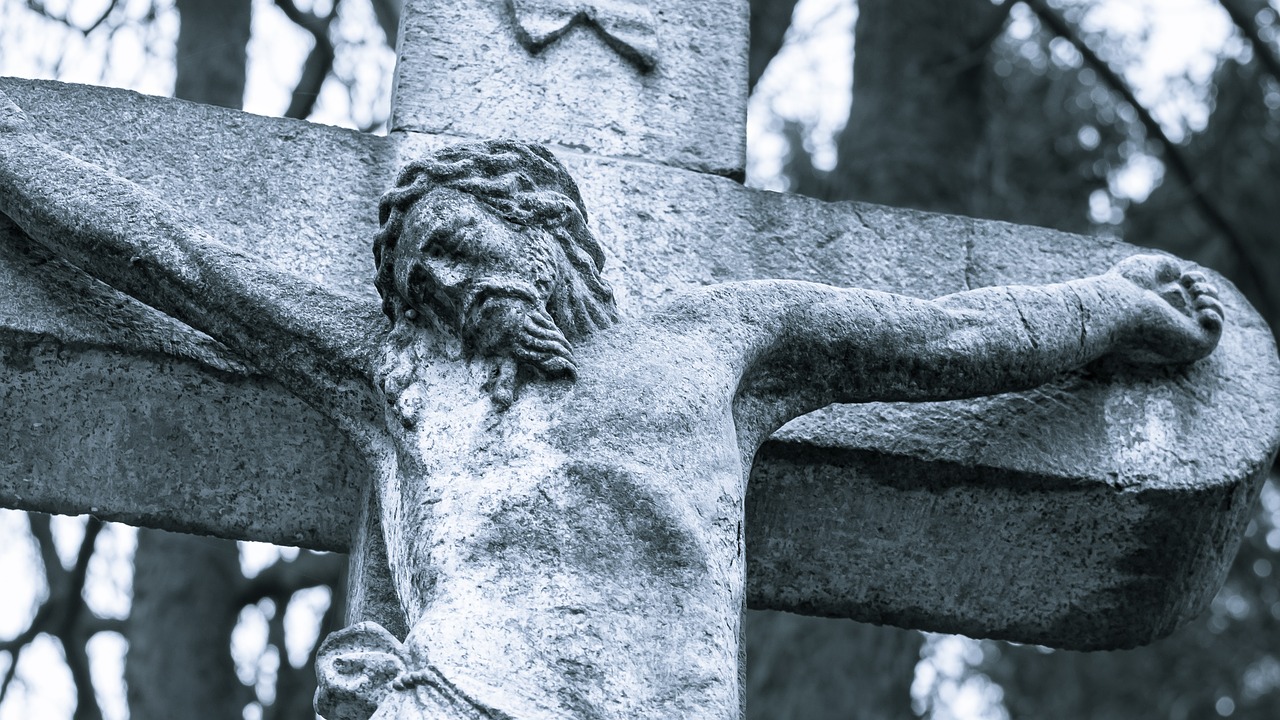 First step: prepare yourself In the morning, as I wake up, I prepare myself by saying: «Today I shall await Him.» I don’t know what the day will bring, but I know that in an unforeseen way, Jesus Forsaken will come to me: in the difficulties, disappointments, perhaps also in my shortcomings, and in bad and painful news. I declare that He will come, and that I am awaiting him. Second step: recognise him During the day, almost always in an unexpected manner, I meet the negativity around me or in me. At these moments it is important to recognize him immediately without hesitation. He, in his abandonment, is already present in every need or fault: in such a way that every pain is “his sacrament” and what matters, within the sign of this pain, is to recognise the countenance of the Crucified and Abandoned, loving and adoring him immediately. Third step: call him by his name Upon meeting him, I am not only aware, but observe and greet him. I call him by his name. Giving a name to every countenance of Jesus Forsaken is a precious exercise and much more than a superficial act. It is no longer “a thing” but a “You.” Precisely in this way, every action of mine becomes contemplation. Fourth step: welcome him warmly Prepare a feast for Jesus Forsaken. By this I mean welcoming him not only hesitatingly, as if it were an inevitable fact, or like welcoming someone who, despite being a friend, drops by at the wrong moment. Furthermore, I don’t want him to sit in the waiting room even for an instant, but will welcome him right away, in the heart of my love and joyful willingness. This is the transition of pain to love, passing through the abandonment in Easter. Only through one who loves in this way will the Forsaken give joy to the world. The feast we prepare for the Forsaken is that feast day which will not see the sunset, because Love never sets. Klaus Hemmerle Published in the Gen’s Magazine 36, Roma 2006, n. 1, p. 3.
First step: prepare yourself In the morning, as I wake up, I prepare myself by saying: «Today I shall await Him.» I don’t know what the day will bring, but I know that in an unforeseen way, Jesus Forsaken will come to me: in the difficulties, disappointments, perhaps also in my shortcomings, and in bad and painful news. I declare that He will come, and that I am awaiting him. Second step: recognise him During the day, almost always in an unexpected manner, I meet the negativity around me or in me. At these moments it is important to recognize him immediately without hesitation. He, in his abandonment, is already present in every need or fault: in such a way that every pain is “his sacrament” and what matters, within the sign of this pain, is to recognise the countenance of the Crucified and Abandoned, loving and adoring him immediately. Third step: call him by his name Upon meeting him, I am not only aware, but observe and greet him. I call him by his name. Giving a name to every countenance of Jesus Forsaken is a precious exercise and much more than a superficial act. It is no longer “a thing” but a “You.” Precisely in this way, every action of mine becomes contemplation. Fourth step: welcome him warmly Prepare a feast for Jesus Forsaken. By this I mean welcoming him not only hesitatingly, as if it were an inevitable fact, or like welcoming someone who, despite being a friend, drops by at the wrong moment. Furthermore, I don’t want him to sit in the waiting room even for an instant, but will welcome him right away, in the heart of my love and joyful willingness. This is the transition of pain to love, passing through the abandonment in Easter. Only through one who loves in this way will the Forsaken give joy to the world. The feast we prepare for the Forsaken is that feast day which will not see the sunset, because Love never sets. Klaus Hemmerle Published in the Gen’s Magazine 36, Roma 2006, n. 1, p. 3.
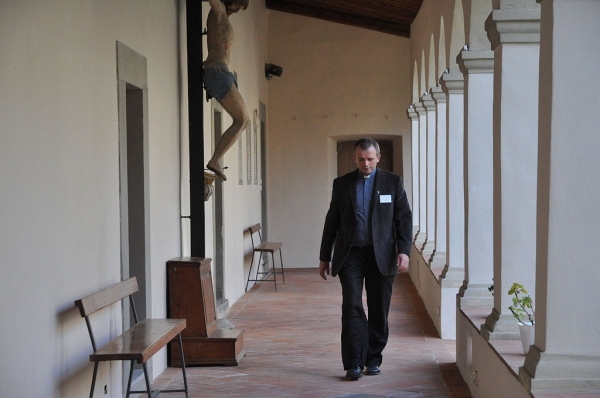
Apr 13, 2017 | Non categorizzato
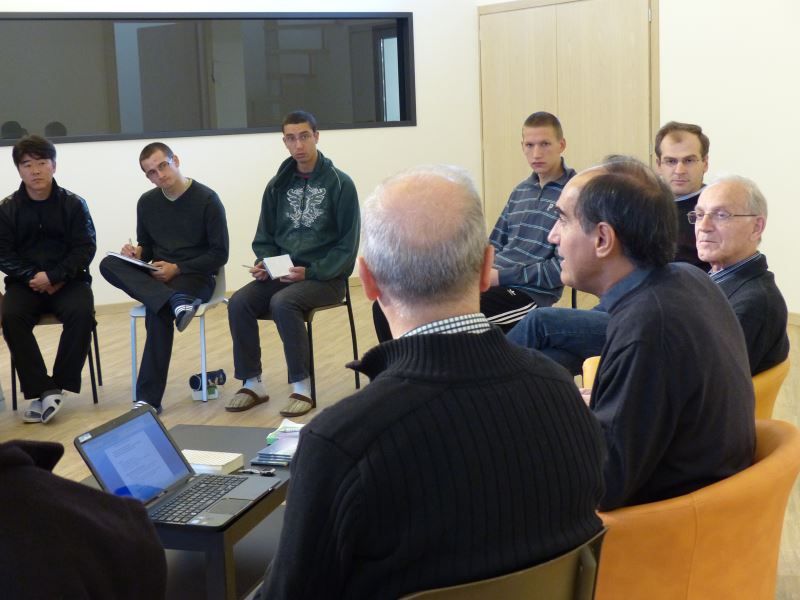 Who trains the trainers? Who, and especially how, accompanies seminarians and priests on their discreet mission and pastoral training? How can we support priests, deacons and seminarians to be, as Pope Francis said to Brazilian bishops in July 2013, “ministers capable of warming the hearts of the people, to walk with them in the night, to dialogue with their illusions and delusions, and to rebuild when things fall apart?” These are relevant questions for all the Christian community and were already being explored during the Second Vatican Council, which led to the creation and opening of schools to train priests in the spirituality of communion. Some history: in 1966 the Focolare Movement’s school for priests began at Grottaferrata, Rome. In 1974 it moved to Frascati, and then in 1984 to the international center at Loppiano, where today it is called the Vinea Mea (“my vineyard”) Spirituality Center. The idea is to offer training in unity for priests, deacons and seminarians who place living fraternity front and center. It is a school of life for men who are called from all over the world to announce the Gospel, to train in a life of communion with their bishops, fellow priests, laypeople in their parishes, and women and men of every creed and culture. This follows the words of Focolare founder Chiara Lubich, who in 1966 told participants at Grottaferrata: “Know how to set aside everything, and leave all pretenses of power behind, to ensure the presence of Jesus among you, living as children in the kingdom of God. This way a “new” pastoral way will be born, together with “new” priests – priests who are Christ for humanity, ready to give their lives for all.” This matches what Pope Francis has a number of times told today’s priests: to go out towards the “existential peripheries.” Since 1966 more than 4,000 priests and seminarians have been trained under the guiding hand of many priests, beginning with Fr. Silvano Cola. Their ages have ranged from 20 to 75, and they have come from close to 60 countries from around the globe. It is an experience that, through the commitment to put Gospel love into practice each day, aims to produce “priests of communion” who are the service of others.
Who trains the trainers? Who, and especially how, accompanies seminarians and priests on their discreet mission and pastoral training? How can we support priests, deacons and seminarians to be, as Pope Francis said to Brazilian bishops in July 2013, “ministers capable of warming the hearts of the people, to walk with them in the night, to dialogue with their illusions and delusions, and to rebuild when things fall apart?” These are relevant questions for all the Christian community and were already being explored during the Second Vatican Council, which led to the creation and opening of schools to train priests in the spirituality of communion. Some history: in 1966 the Focolare Movement’s school for priests began at Grottaferrata, Rome. In 1974 it moved to Frascati, and then in 1984 to the international center at Loppiano, where today it is called the Vinea Mea (“my vineyard”) Spirituality Center. The idea is to offer training in unity for priests, deacons and seminarians who place living fraternity front and center. It is a school of life for men who are called from all over the world to announce the Gospel, to train in a life of communion with their bishops, fellow priests, laypeople in their parishes, and women and men of every creed and culture. This follows the words of Focolare founder Chiara Lubich, who in 1966 told participants at Grottaferrata: “Know how to set aside everything, and leave all pretenses of power behind, to ensure the presence of Jesus among you, living as children in the kingdom of God. This way a “new” pastoral way will be born, together with “new” priests – priests who are Christ for humanity, ready to give their lives for all.” This matches what Pope Francis has a number of times told today’s priests: to go out towards the “existential peripheries.” Since 1966 more than 4,000 priests and seminarians have been trained under the guiding hand of many priests, beginning with Fr. Silvano Cola. Their ages have ranged from 20 to 75, and they have come from close to 60 countries from around the globe. It is an experience that, through the commitment to put Gospel love into practice each day, aims to produce “priests of communion” who are the service of others.  After close to two years of renovations, the spirituality center reopened in October 2013, having risen to the challenge of marrying the classic with modern. It brought together the Church’s centuries of tradition with the communitarian dynamic – both in the community’s training methods and in the architecture itself. “Vinea Mea,” explains Fr. Imre Kiss, who heads the center presently, “offers training in the light of the Focolare Movement’s spirituality of communion. Over the course of a year, the school offers courses on spirituality, theology, anthropology and ecclesiology, as well as seminars on current topics such as youth, family, communication, and dialogue between religions and cultures. “By sharing their lives in small communities, it responds to needs expressed by many priests: to tangibly experience a spirituality that is based on communion, in order then to transmit it to the women and men of our times.” The center works in tandem with similar setups in the movement’s other little cities – in Poland, Germany, Kenya, Brazil, Argentina and the Philippines. It also often promotes annual courses and workshops for seminary educators in order to sustain and spread a priestly lifestyle that is based on communion. In November 2016 Vinea Mea inaugurated the Evangelii Gaudium Center, in collaboration with the Sophia University Institute. This emerged in response to the pope’s invitation to give a new push to the renewal work necessary for a new phase of evangelization in the Church: the call to go out towards the existential edges of our time. One of the center’s first initiatives, organized by Vinea Mea, has been a course that goes into depth into the apostolic exhortation Evangelii Gaudium. From Loppiano online
After close to two years of renovations, the spirituality center reopened in October 2013, having risen to the challenge of marrying the classic with modern. It brought together the Church’s centuries of tradition with the communitarian dynamic – both in the community’s training methods and in the architecture itself. “Vinea Mea,” explains Fr. Imre Kiss, who heads the center presently, “offers training in the light of the Focolare Movement’s spirituality of communion. Over the course of a year, the school offers courses on spirituality, theology, anthropology and ecclesiology, as well as seminars on current topics such as youth, family, communication, and dialogue between religions and cultures. “By sharing their lives in small communities, it responds to needs expressed by many priests: to tangibly experience a spirituality that is based on communion, in order then to transmit it to the women and men of our times.” The center works in tandem with similar setups in the movement’s other little cities – in Poland, Germany, Kenya, Brazil, Argentina and the Philippines. It also often promotes annual courses and workshops for seminary educators in order to sustain and spread a priestly lifestyle that is based on communion. In November 2016 Vinea Mea inaugurated the Evangelii Gaudium Center, in collaboration with the Sophia University Institute. This emerged in response to the pope’s invitation to give a new push to the renewal work necessary for a new phase of evangelization in the Church: the call to go out towards the existential edges of our time. One of the center’s first initiatives, organized by Vinea Mea, has been a course that goes into depth into the apostolic exhortation Evangelii Gaudium. From Loppiano online
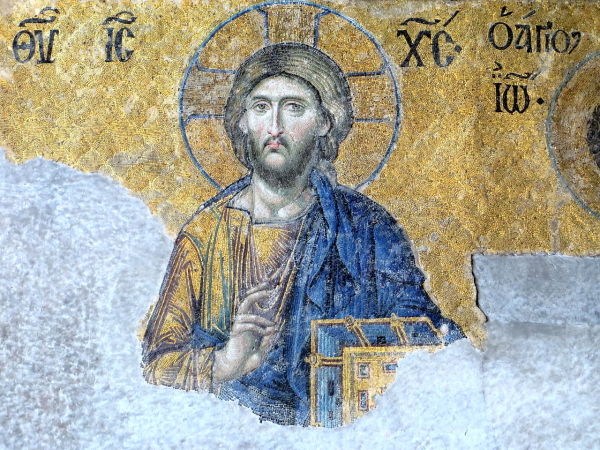
Apr 12, 2017 | Non categorizzato
 |
| Christ is Risen! Every suffering, separation, division, failure, and even death itself can become for us, because of Him, a source of light and peace. Called to give witness to the great message of the Resurrection, let us renew our common commitment to give hope and joy to humanity in this time of momentous change. With best wishes for a Happy Easter!
Maria Voce
|
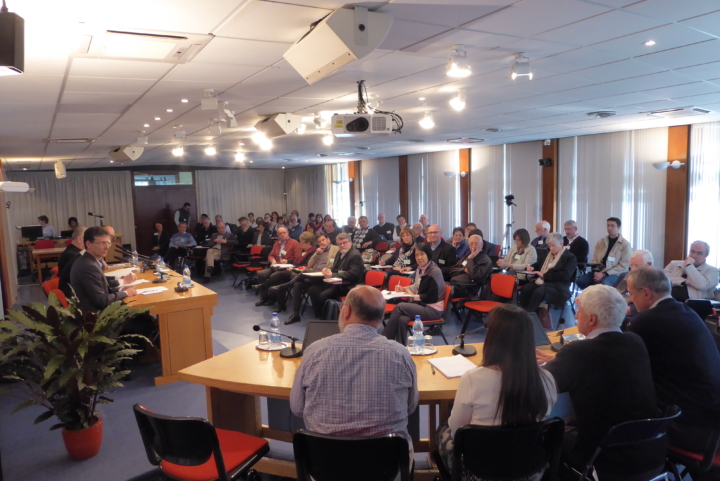
Apr 11, 2017 | Non categorizzato
 The Gospel and Culture is a delicate topic. It has been widely discussed for centuries in theological, sociological, pastoral, political and educational environments. There are Church documents, such as Evangelization in the Modern World and the Gospel of Joy that are indispensable references. If you add the word “charism” to the mix – which nowadays is being attributed to non-ecclesial figures and realities as well – then the search for agreement becomes challenging, especially when you put together experts from different cultures. Yet, this was the striking feature of the “Gospel – Charism – Culture” conference held on April 6-7 at the Focolare International Centre in Rocca di Papa, Italy. In her welcome address, Maria Voce pointed out the deep goal of the gathering: to promote “a culture of peace, a culture of resurrection” that will have a growing impact.” Experts from Asia, Africa, the Americas and Europe compared notes during three thematic sessions. Charisms and the evangelization of the culture. The first session dealt with two questions: “How to respond to the urgency of the Gospel becoming culture” by Archbishop Zani; “How to accelerate the communion among charisms in the face of present challenges?” by Sister Motta; and how “nowadays, many “charisms” are born in non-religious environments, while there is not enough prophecy in the Church itself,” by Luigino Bruni. During successive discussions the experts underlined how “every confrontation with the other is an encounter with a social family’s history and culture” (Guadiano); that “the media have their own charism for a united world, if they maintain their autonomy” (Zanzucchi); that “the evangelization of the culture does not pass through the authority, but through the witness” (Archbishop Zani). Finally, there was the appeal made by Bruni: “We need a new narrative; the young people of today do not understand a language from the 1900s.” From inculturation to interculturality. The second session was opened by Jesús Morán: “European elaborations on culture are far from all there is to say about Christ. In the encounter with other cultures something is expressed that has not yet been expressed.” The goal, as Philippine Andrew Recepcion recalled, “is not a non-Western Christianity, but a beyond-Western [Christianity].” Soni Vargas from Bolivia showed some passion when asking that we move on from the paradigm of inculturation, which does not express the active reciprocity required by Chiara Lubich, to a paradigm of interculturality: “No longer “mission”, but “inter-gift” within a Trinitarian dynamic in which a superiority of one culture over another doesn’t even exist.” During the debate, Chinese Vania Cheng, remarked: “Asia is asking for listening, respect and silence because the inner being reveals more than the word.” Cameroonian, Raphael Takougang, remembered that “in interculturation,the knowledge isn’t communicated, it’s passed on by having an experience together.” Roberto Catalano underscored what Chiara had seen long ago when she invited everyone to “make Christ to be born in the heart of the cultures.” Lucas Cerviño, who was on a link-up from Mexico: “I need to create the conditions so that the seed of God that is already inside a culture can flower . . . but never imposing the way.” Morán concluded: “It’s true that there must not be control or superiority of a culture over another, but this doesn’t mean that there isn’t a central point: Christ is the heart of the world.” Youth – faith – vocational discernment. The third session focused on the upcoming Synod of Bishops and was opened by Italo Fiorin: “Educating means helping an other to find the meaning of his or her own existence. Educating is the art of accompanying.” Sister Jenny Favarian testified to how: “the discovery of the vocation to love makes totally beautiful flowers to blossom.” Maria Rosa Logozzo told about the contact of a group of young people from different cultures – both believers and non-believers – with the focolare in Dublin, Ireland: “The possibility of having an experience of God in a community draws them.” After a rich debate, Fiorin concluded by underscoring the importance of the “pedagogy of reality” and especially of service learning: “learning to serve; serving to learn.” On the final afternoon, theologian Piero Coda gave a presentation on the question: What does it mean when we say that the Church is born from the abandonment of Jesus on the cross? “A life in exile: the capacity to detach from one’s own roots in order to live the other . . . testifying to the folly of God’s love. . .” The discussions from these two days, Francisco Canzani recalled, will be transformed into articles for the Gen magazines, Unità e Carismi, Nuova Umanità, Città Nuova that will help to reflect on current ecclesial and cultural times.
The Gospel and Culture is a delicate topic. It has been widely discussed for centuries in theological, sociological, pastoral, political and educational environments. There are Church documents, such as Evangelization in the Modern World and the Gospel of Joy that are indispensable references. If you add the word “charism” to the mix – which nowadays is being attributed to non-ecclesial figures and realities as well – then the search for agreement becomes challenging, especially when you put together experts from different cultures. Yet, this was the striking feature of the “Gospel – Charism – Culture” conference held on April 6-7 at the Focolare International Centre in Rocca di Papa, Italy. In her welcome address, Maria Voce pointed out the deep goal of the gathering: to promote “a culture of peace, a culture of resurrection” that will have a growing impact.” Experts from Asia, Africa, the Americas and Europe compared notes during three thematic sessions. Charisms and the evangelization of the culture. The first session dealt with two questions: “How to respond to the urgency of the Gospel becoming culture” by Archbishop Zani; “How to accelerate the communion among charisms in the face of present challenges?” by Sister Motta; and how “nowadays, many “charisms” are born in non-religious environments, while there is not enough prophecy in the Church itself,” by Luigino Bruni. During successive discussions the experts underlined how “every confrontation with the other is an encounter with a social family’s history and culture” (Guadiano); that “the media have their own charism for a united world, if they maintain their autonomy” (Zanzucchi); that “the evangelization of the culture does not pass through the authority, but through the witness” (Archbishop Zani). Finally, there was the appeal made by Bruni: “We need a new narrative; the young people of today do not understand a language from the 1900s.” From inculturation to interculturality. The second session was opened by Jesús Morán: “European elaborations on culture are far from all there is to say about Christ. In the encounter with other cultures something is expressed that has not yet been expressed.” The goal, as Philippine Andrew Recepcion recalled, “is not a non-Western Christianity, but a beyond-Western [Christianity].” Soni Vargas from Bolivia showed some passion when asking that we move on from the paradigm of inculturation, which does not express the active reciprocity required by Chiara Lubich, to a paradigm of interculturality: “No longer “mission”, but “inter-gift” within a Trinitarian dynamic in which a superiority of one culture over another doesn’t even exist.” During the debate, Chinese Vania Cheng, remarked: “Asia is asking for listening, respect and silence because the inner being reveals more than the word.” Cameroonian, Raphael Takougang, remembered that “in interculturation,the knowledge isn’t communicated, it’s passed on by having an experience together.” Roberto Catalano underscored what Chiara had seen long ago when she invited everyone to “make Christ to be born in the heart of the cultures.” Lucas Cerviño, who was on a link-up from Mexico: “I need to create the conditions so that the seed of God that is already inside a culture can flower . . . but never imposing the way.” Morán concluded: “It’s true that there must not be control or superiority of a culture over another, but this doesn’t mean that there isn’t a central point: Christ is the heart of the world.” Youth – faith – vocational discernment. The third session focused on the upcoming Synod of Bishops and was opened by Italo Fiorin: “Educating means helping an other to find the meaning of his or her own existence. Educating is the art of accompanying.” Sister Jenny Favarian testified to how: “the discovery of the vocation to love makes totally beautiful flowers to blossom.” Maria Rosa Logozzo told about the contact of a group of young people from different cultures – both believers and non-believers – with the focolare in Dublin, Ireland: “The possibility of having an experience of God in a community draws them.” After a rich debate, Fiorin concluded by underscoring the importance of the “pedagogy of reality” and especially of service learning: “learning to serve; serving to learn.” On the final afternoon, theologian Piero Coda gave a presentation on the question: What does it mean when we say that the Church is born from the abandonment of Jesus on the cross? “A life in exile: the capacity to detach from one’s own roots in order to live the other . . . testifying to the folly of God’s love. . .” The discussions from these two days, Francisco Canzani recalled, will be transformed into articles for the Gen magazines, Unità e Carismi, Nuova Umanità, Città Nuova that will help to reflect on current ecclesial and cultural times.
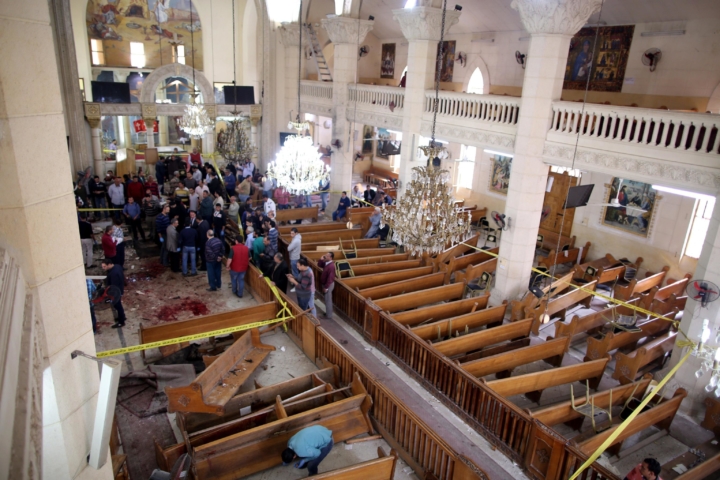
Apr 10, 2017 | Focolare Worldwide
 “It’s an attack not just on Christians but on religion as well,” commented the members of the local Focolare community in Egypt, with reference to the bombings on Palm Sunday. This sentiment was confirmed through the immediate solidarity shown by the Muslim community, many of whom offered to donate blood at the hospitals. “Being deeply religious people, Muslims and Christians in Egypt felt called upon to strengthen their faith after the attacks,” a member of the Movement said. Two Coptic Christian churches were targetted by terrorists in the city of Tanta in the Nile Delta, and in Alexandria, the second largest city of the North African country. In Tanta the Church of St George was hit causing 27 casualties. In Alexandria, Church of St Mark was bombed killing 18 people. The President of Egypt, Abdel Fattah al-Sisi has declared a three-month state of emergency, during which all public manifestations and events will be suspended, among other restrictions. The attacks coincided with the celebration of Palm Sunday, which marks the start of the most important liturgical week for Christians. It was a sombre beginning to Holy Week. The passage of Revelation came to mind which describes a “great multitude (…) from every nation (…) holding palm branches in their hands” who had “washed their robes in the blood of the Lamb (…)”. (Revelation 7:9-14). On Sunday morning, at St Peter’s Square, the Holy Father prayed “for the victims”, expressing his condolences “to my dear brother, Pope Tawadros II, the Coptic Church and the entire Egyptian nation.” And he concluded: “May the Lord convert the hearts of those who sow terror, violence and death.”
“It’s an attack not just on Christians but on religion as well,” commented the members of the local Focolare community in Egypt, with reference to the bombings on Palm Sunday. This sentiment was confirmed through the immediate solidarity shown by the Muslim community, many of whom offered to donate blood at the hospitals. “Being deeply religious people, Muslims and Christians in Egypt felt called upon to strengthen their faith after the attacks,” a member of the Movement said. Two Coptic Christian churches were targetted by terrorists in the city of Tanta in the Nile Delta, and in Alexandria, the second largest city of the North African country. In Tanta the Church of St George was hit causing 27 casualties. In Alexandria, Church of St Mark was bombed killing 18 people. The President of Egypt, Abdel Fattah al-Sisi has declared a three-month state of emergency, during which all public manifestations and events will be suspended, among other restrictions. The attacks coincided with the celebration of Palm Sunday, which marks the start of the most important liturgical week for Christians. It was a sombre beginning to Holy Week. The passage of Revelation came to mind which describes a “great multitude (…) from every nation (…) holding palm branches in their hands” who had “washed their robes in the blood of the Lamb (…)”. (Revelation 7:9-14). On Sunday morning, at St Peter’s Square, the Holy Father prayed “for the victims”, expressing his condolences “to my dear brother, Pope Tawadros II, the Coptic Church and the entire Egyptian nation.” And he concluded: “May the Lord convert the hearts of those who sow terror, violence and death.”
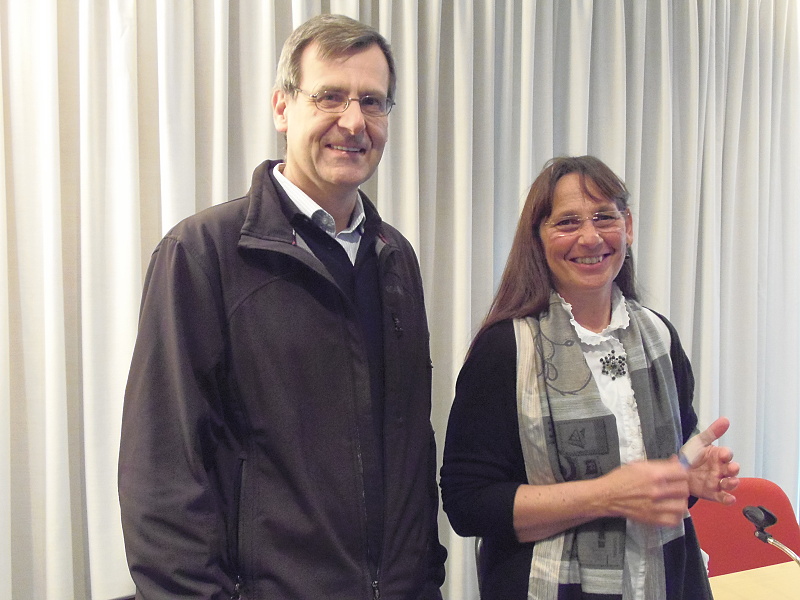
Apr 10, 2017 | Non categorizzato
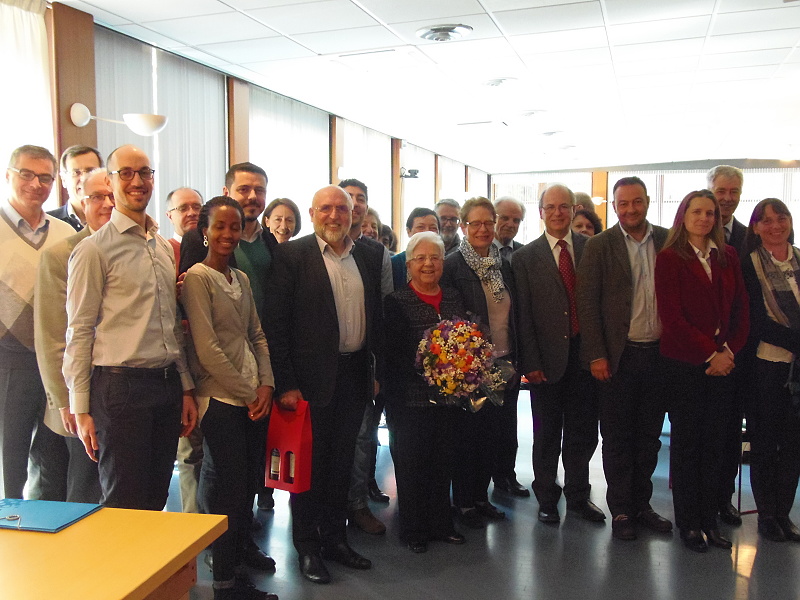
With Maria Voce and Jesús Morán
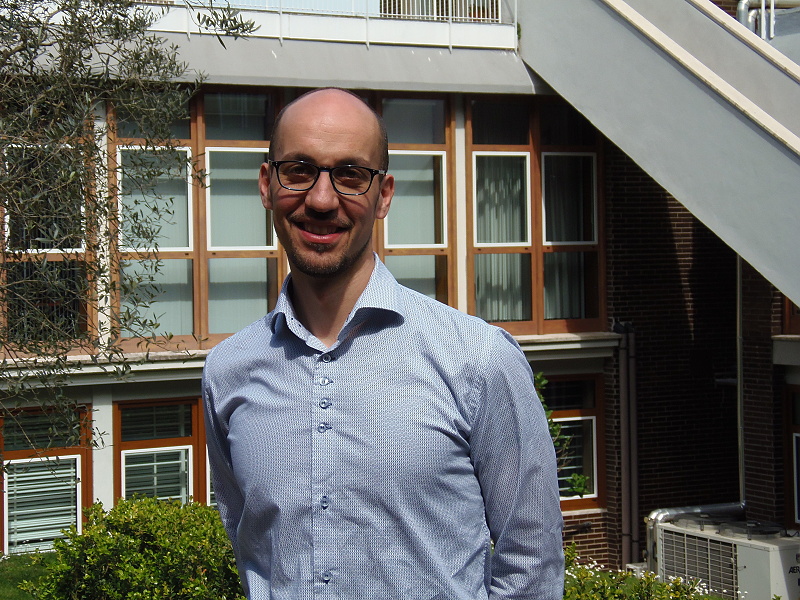
avide Bilardi, adjunct representative at the centre in Geneva, has been working in New Humanity for seven years: Davide Bilardi

Marco Desalvo, President and Cecilia Landucci, Vice president

 November 3, 1955 If universal history is humanity’s fifth Gospel, personal events also are for each of us. Seen from God’s perspective, they appear designed to bring us from being scattered back to unity with God. Detachment from people dear to us and losing distinctions can become a way of clearing out all human factors and leave us alone with God. Thus every day takes on the value of a divine adventure, if it is used to ascend along a ray – our ray – that connects us to God’s sun. Life has been called a march toward death, but it is progress toward freedom, the peak where the Father awaits us. So it is a march towards life, one that never ends. December 19, 1956 Christian wisdom, in asking us to renounce ourselves, is not really about renouncing, but gaining. In place of human ambitions, divine ambitions ignite. It recommends we put God in place of our ego, and by doing so, lift ourselves up from the human level to the divine one, together with the Trinity. It is humility that works limitless greatness. This is why eventually, from that height, the world appears wretched, riches appear chaff and great things turn to sand. So renounce ourselves to be always to be with God, transfer the eternal into time, make the earth a paradise. Suffering becomes raw material for greatness; the cross becomes the stairs to the eternal Father. December 26, 1956 Life is a unique opportunity given us to love. October 16, 1959 In response to individualism today, people nourish their collective lives and give socialization a central role in study and education. It is a movement that helps guide us toward our brother and pushes us to ascend towards God linked together. Yet there is also a danger in doing this: that in the fury of staying with those around us, we forget how to stay with God. Our brother is valuable as a ianua coeli (gate of heaven), but if one cannot see the Father behind him, one risks substituting the desolation of individualism with the desolation of the group. It is the Father who accompanies us, helps us, enlivens us. This is why, with the delusions that rain down each day on the human experience, he reminds us that there is also a divine experience. Or better, that the communion with our brothers passes to the Father, and from the Father returns to our brother. Igino Giordani
November 3, 1955 If universal history is humanity’s fifth Gospel, personal events also are for each of us. Seen from God’s perspective, they appear designed to bring us from being scattered back to unity with God. Detachment from people dear to us and losing distinctions can become a way of clearing out all human factors and leave us alone with God. Thus every day takes on the value of a divine adventure, if it is used to ascend along a ray – our ray – that connects us to God’s sun. Life has been called a march toward death, but it is progress toward freedom, the peak where the Father awaits us. So it is a march towards life, one that never ends. December 19, 1956 Christian wisdom, in asking us to renounce ourselves, is not really about renouncing, but gaining. In place of human ambitions, divine ambitions ignite. It recommends we put God in place of our ego, and by doing so, lift ourselves up from the human level to the divine one, together with the Trinity. It is humility that works limitless greatness. This is why eventually, from that height, the world appears wretched, riches appear chaff and great things turn to sand. So renounce ourselves to be always to be with God, transfer the eternal into time, make the earth a paradise. Suffering becomes raw material for greatness; the cross becomes the stairs to the eternal Father. December 26, 1956 Life is a unique opportunity given us to love. October 16, 1959 In response to individualism today, people nourish their collective lives and give socialization a central role in study and education. It is a movement that helps guide us toward our brother and pushes us to ascend towards God linked together. Yet there is also a danger in doing this: that in the fury of staying with those around us, we forget how to stay with God. Our brother is valuable as a ianua coeli (gate of heaven), but if one cannot see the Father behind him, one risks substituting the desolation of individualism with the desolation of the group. It is the Father who accompanies us, helps us, enlivens us. This is why, with the delusions that rain down each day on the human experience, he reminds us that there is also a divine experience. Or better, that the communion with our brothers passes to the Father, and from the Father returns to our brother. Igino Giordani






 First step: prepare yourself In the morning, as I wake up, I prepare myself by saying: «Today I shall await Him.» I don’t know what the day will bring, but I know that in an unforeseen way, Jesus Forsaken will come to me: in the difficulties, disappointments, perhaps also in my shortcomings, and in bad and painful news. I declare that He will come, and that I am awaiting him. Second step: recognise him During the day, almost always in an unexpected manner, I meet the negativity around me or in me. At these moments it is important to recognize him immediately without hesitation. He, in his abandonment, is already present in every need or fault: in such a way that every pain is “his sacrament” and what matters, within the sign of this pain, is to recognise the countenance of the Crucified and Abandoned, loving and adoring him immediately. Third step: call him by his name Upon meeting him, I am not only aware, but observe and greet him. I call him by his name. Giving a name to every countenance of Jesus Forsaken is a precious exercise and much more than a superficial act. It is no longer “a thing” but a “You.” Precisely in this way, every action of mine becomes contemplation. Fourth step: welcome him warmly Prepare a feast for Jesus Forsaken. By this I mean welcoming him not only hesitatingly, as if it were an inevitable fact, or like welcoming someone who, despite being a friend, drops by at the wrong moment. Furthermore, I don’t want him to sit in the waiting room even for an instant, but will welcome him right away, in the heart of my love and joyful willingness. This is the transition of pain to love, passing through the abandonment in Easter. Only through one who loves in this way will the Forsaken give joy to the world. The feast we prepare for the Forsaken is that feast day which will not see the sunset, because Love never sets.
First step: prepare yourself In the morning, as I wake up, I prepare myself by saying: «Today I shall await Him.» I don’t know what the day will bring, but I know that in an unforeseen way, Jesus Forsaken will come to me: in the difficulties, disappointments, perhaps also in my shortcomings, and in bad and painful news. I declare that He will come, and that I am awaiting him. Second step: recognise him During the day, almost always in an unexpected manner, I meet the negativity around me or in me. At these moments it is important to recognize him immediately without hesitation. He, in his abandonment, is already present in every need or fault: in such a way that every pain is “his sacrament” and what matters, within the sign of this pain, is to recognise the countenance of the Crucified and Abandoned, loving and adoring him immediately. Third step: call him by his name Upon meeting him, I am not only aware, but observe and greet him. I call him by his name. Giving a name to every countenance of Jesus Forsaken is a precious exercise and much more than a superficial act. It is no longer “a thing” but a “You.” Precisely in this way, every action of mine becomes contemplation. Fourth step: welcome him warmly Prepare a feast for Jesus Forsaken. By this I mean welcoming him not only hesitatingly, as if it were an inevitable fact, or like welcoming someone who, despite being a friend, drops by at the wrong moment. Furthermore, I don’t want him to sit in the waiting room even for an instant, but will welcome him right away, in the heart of my love and joyful willingness. This is the transition of pain to love, passing through the abandonment in Easter. Only through one who loves in this way will the Forsaken give joy to the world. The feast we prepare for the Forsaken is that feast day which will not see the sunset, because Love never sets. 
 Who trains the trainers? Who, and especially how, accompanies seminarians and priests on their discreet mission and pastoral training? How can we support priests, deacons and seminarians to be, as
Who trains the trainers? Who, and especially how, accompanies seminarians and priests on their discreet mission and pastoral training? How can we support priests, deacons and seminarians to be, as 




